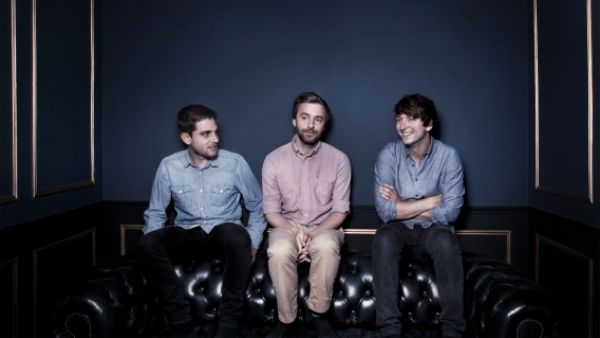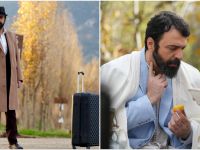It has been customary in Beirut’s iteration of the Fête de la Musique to program bands from France. For the 16th edition of the solstice event, Baden Baden was invited to headline Tuesday’s evening of musical performances – their second Lebanon show after a Monday night concert in Zahle.
Founded in 2008, this indie pop band made an impression with its bilingual first album. The choice stood out in the French music scene, where artists typically choose to sing either in French or in English.
To spice up their musical creations the trio – Eric Javelle (singer, guitarist), Julien Lardé (composer and guitarist) and, Gabriel Vigne (drums) – are invariably accompanied by more musicians, to create what they themselves describe as “a happy melancholy.”
What may sound like a contradiction in terms is in fact a sound that has helped renew French pop. In their second album, “Mille Eclairs,” Baden Baden decided to put aside bilingualism. This didn’t seem to drive away the band’s fan base, as it continues to tour the world and export the new French musical scene.
The Daily Star met with Julien Lardé, the band’s guitarist and composer, for an exclusive interview.
TDS: You often play at large francophone music festivals such as the Francofolies in Montreal and La Rochelle, and the Fête de la Musique here in Beirut. Is that a coincidence?
A: I think it mainly comes from the fact that we are usually invited to those festivals. It just so happens that lately we had concerts abroad several times in a row. Last year we did Equator, and Colombia right after the Montreal Francofolies, and this year we did Egypt, Lebanon and we’ll end with Turkey.
TDS: Does the audience usually know you in all those countries?
A: There is a majority of people at those concerts that don’t know us and for whom it’s a discovery, because we are more famous in and around France. We are lucky, though, because every time we play at large events we realize that the reactions are always very positive, there is a genuine enthusiasm. With every audience that we’ve come to meet, whether in Latin America or here, we can really feel a sincere interest for music and for those sorts of events.
TDS: Your first album, “Coline,” was bilingual, whereas your second, “Mille Eclairs,” was in French. Where did the change come from?
A: It was not a commercial choice. It’s just that in English, there were fewer things for us to tell [to our audience]. In French, there are more words in each sentence, so the flow has to be quicker. You can actually feel it. There are songs in which the rhythm is a lot more out of breath. There are many more words, and it feels a lot chattier. All this comes from French. It’s liberating for us. Even in terms of themes, singing in one’s mother tongue is really disinhibiting.
With “Coline,” we realized that the pieces that worked most, that pushed us the most, were the ones in French. So naturally, when the time came to compose “Mille Eclairs,” French came up first ... This doesn’t mean that we completely turned our backs on English either, we will see with the third album.
TDS: What role does language play in music for you?
A: It really depends on the way you envision music. Everyone in the band enjoys Anglo-Saxon music, but [as francophones] the relationship with your own music is not necessarily the same when you sing in French. When you sing in your own language, there are many more things that you can share, things that echo within the people who will listen to your music. Our choice was that with French it would be easier for us to pass on something deeper and stronger.
TDS: Since you started as a band, have there been genres that influenced you in a way that might affect your future musical production?
A: We are always listening to many different things, so most likely. We are quite curious musically, so we listen to many things, but I don’t think it will lead to a radical style change for our music. Maybe we’ll add a little bit more electro, and we’ll simplify by getting rid of the keyboard. All in all, we are always listening to something, whether it’s rap, variété française, or rock. There is no one single genre that motivates us. We are currently writing our third album but it’s still at the embryonic stage. We are trying to release it in the beginning or the middle of next year.
TDS: Do you have any projects outside of Baden Baden?
A: Actually, we all have jobs on the side. We don’t actually make a living from our music. It’s just one facet of our lives. Eric is an architect, and I started a company in France. Baden Baden is one of our lives, and the idea for us is to conciliate everything and keep doing what we love.








